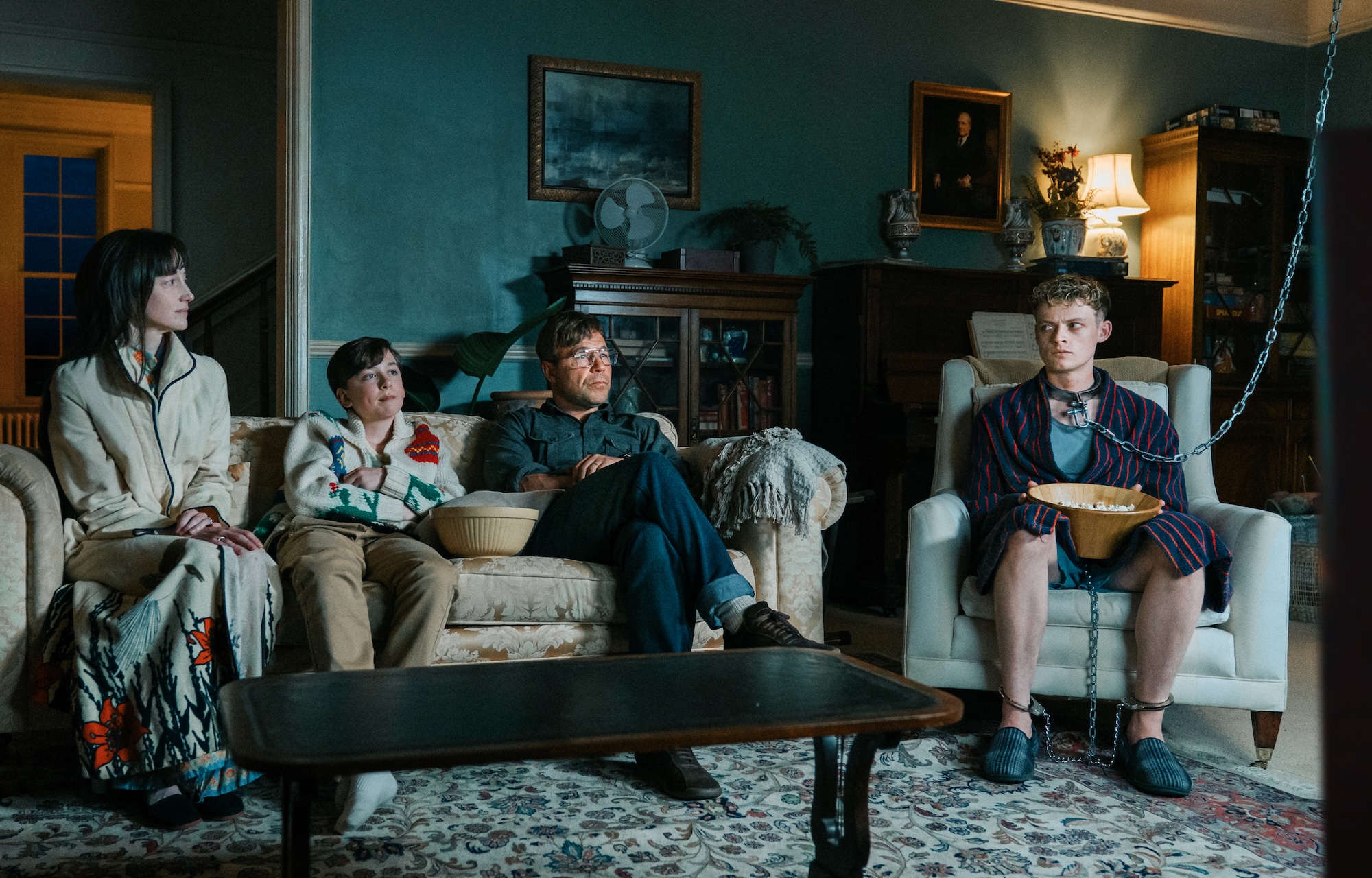Good Boy
Good Boy
VERDICT: 'Good Boy' delivers a delightfully strange tale about the limits of parenthood.
If you believe the five o’clock news, metropolitan cities have become hotbeds of criminal activity, with young people in particular wilding out. Of course, rebellion is a generational worry as mods, hippies, punks, and hackers have all caused parents and officials to wring their hands. Now and then, an op-ed will yearn for the days when a stricter hand was the norm, but Jan Komasa’s Good Boy puts it into action. This delicious and devilish anti-thriller interrogates the mindset of the overly anxious without letting the kids who think there’s no consequences for their actions off the hook.
Tommy (Anson Boon) is your typical English lout. As the film opens, he’s out having a night, fighting, dancing, puking, snorting, drinking, and fucking all that he can. As he staggers home, utterly wasted, there’s a flash of car headlights and the next thing he knows, he wakes up chained in a cellar with a metal collar around his neck. Tommy’s unlikely captors are a mild-mannered family led by Chris (Stephen Graham), his emotionally fragile wife Kathryn (Andrea Riseborough), and their ten-year-old son Jonathan (Kit Rakusen). They live in a small estate deep in the countryside; Tommy could scream for help all he wants, but no one would hear him. Chris’ objective, on the surface, is right there in the film’s title — he wants to rehabilitate the young man who has made no secret of his penchant for ultraviolence, posting it on social media for all to see.
Understandably, Tommy at first rages against his jailers, which also includes Rina (Monika Frajczyk), a Macedonian housekeeper, whose silence is bought on the promise of not reporting her to immigration authorities. But it soon emerges that Chris’ objectives are about making Tommy a more permanent part of a family suffering from grief. As Tommy is slowly allowed more freedom, given books to read, and spends more time getting to know each member of the household, the tattooed, loudmouthed hooligan who entered the house, becomes a softer spoken, gentler, and more considerate young man. The idea that he could willingly turn into an ideal, well-behaved son and brother suddenly seems not so unlikely…or is he just playing a part?
The film’s assured eccentricity relies heavily on the skill editor Agnieszka Glinska who ensures Tommy’s hand isn’t titled one way or the other until the climax demands it. Paired with Boon’s perfectly elusive turn as Tommy, and Abel Korzeniowski’s score which subtly supports the picture, it allows Good Boy to become more unnerving with each passing moment. The mood is reminiscent of the first half of Christian Tafrup’s 2022 slow-burner Speak No Evil in which the secrets of a strange household begin to stick uncomfortably under your chest.
Instead of the powerfully bleak conclusion of that picture, the screenplay by Bartek Bartosik and Naqqash Khalid takes a different, but also uneasy turn. Without giving away the goods, it suggests that Tommy, even if against his will, did come away with some (albeit twisted) lessons about the better person he could become.
In this way, Good Boy is an intriguing concoction that oddly echoes A Clockwork Orange. Alex and Tommy would probably get along like gangbusters, even if their paths of healing ultimately diverge. “Destroy what destroys you,” Chris advises Tommy. “Goodness is something to be chosen. When a man cannot choose he ceases to be a man,” the prison chaplain tells Alex. The statements are two sides of the same coin, coming from societies that in both pictures appear to treat the symptoms of bad behaviour, but not the disease.
Director: Jan Komasa
Screenplay: Bartek Bartosik, Naqqash Khalid
Cast: Stephen Graham, Andrea Riseborough, Anson Boon, Kit Rakusen
Producers: Jeremy Thomas, Ewa Piaskowska, Jerzy Skolimowski
Cinematography: Michal Dymek
Production design: Fletcher Jarvis
Costume design: Julian Day
Editing: Agnieszka Glinska
Music: Abel Korzeniowski
Sound: Radoslaw Ochnio
Production companies: Skopia Film (Poland), Recorded Picture Company (United Kingdom)
World sales: HanWay Films
Venue: Toronto International Film Festival (Centrepiece)
In English
110 minutes


